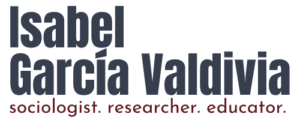
Isabel García Valdivia views teaching and mentorship as a collaborative process where teachers and students create open co-learning environments.
TEACHING
Isabel García-Valdivia views teaching as a collaborative process; she creates and sustains an open learning environment that fosters intellectual engagement and learning with others, trains students to identify and generate solutions to social problems, and teaches students to recognize different forms of knowledge. She equips students to use the sociological theory learned in the classroom to develop tools, strategies, and reflection to address real-world problems and create social change beyond the classroom.
Isabel has taught courses in income inequality, led discussion course sections on sociological methods and theory, and biweekly seminars for the Berkeley Connect program (including summer Bridge Connect) at the University of California, Berkeley, Department of Sociology.
Beyond teaching, Isabel was a reader (or course assistant) for ten semesters for the following courses: Sociology of Culture, Sociology of Education, Sociology of the Family, Sociology of Organizations and Social Institutions, Principles of Sociology (American Cultures), and Sociology of Virtual Communities/Social Media.
She also prepared teaching tools. Isabel created a Migration Slide Deck for the Berkeley Interdisciplinary Migration Initiative that is a resource for students, lecturers, and researchers who teach and present on migration-related topics. It provides easy-to-read visuals, figures, and tables organized into seven modules on different aspects of migration: global migration, demographics, migrant illegality, immigration enforcement, immigration impact on the U.S., immigrant integration, and migration motives. She was also the project manager for constructing a data module that examines a United Nations migration data set that allowed undergraduate students in the International & Area Studies 150: Migration course to explore the migration patterns and populations of sending and receiving countries worldwide.
She is prepared to teach core sociology courses: general research methods (e.g., advanced qualitative methods courses), sociological theory, and introduction to sociology courses. Isabel also can teach courses in substantive areas including: [im]migration (and immigrant families), race and ethnicity (including Latinx studies), and life course/aging.

MENTORSHIP
Isabel has benefited from sustained mentorship in education from her participation in the Associated Colleges of Illinois College Readiness Program in high school to numerous formal and informal mentorship programs in college (e.g., Chicano Latino Student Affairs Sponsor Program) and graduate school. She actively sought and found teachers, faculty, staff, and peer mentors throughout her education, professional, and life trajectory to learn the necessary skills and (often unspoken) knowledge to become who she is today. Her commitment to teaching stems from these experiences as a life learner and her commitment to giving accessible and quality education to all.
Isabel has mentored undergraduate students in research, demystifying higher education processes, and pursuing graduate or professional degrees – especially for underrepresented students.
In research, she worked with four undergraduate students on developing independent research questions, methodologies, analysis, and writing up their honors senior theses – all focused on education, immigration, and theory literatures. She supervised 15 undergraduate research assistants for almost two years, teaching them critical qualitative research skills such as conducting interviews, quality control of interview transcripts, coding using qualitative data analysis software (ATLAS.ti), and writing analytical memos through weekly research team meetings and independent assignments. This was facilitated via the Undergraduate Research Apprenticeship Program (URAP).
Isabel also helped demystify higher education processes – including the hidden curriculum – by working with underrepresented students in multiple campus programs. Formally, she mentored through the Graduate Students de la Raza Colectiva Mentoring Program, the Chicanx Latinx Student Development Office “From Day One” Program, where she shared advice (or consejos) on how to navigate UC Berkeley and life after Berkeley ranging from course selection, employment and internship opportunities, reviewing CVs and job applications, and sharing what she wished she learned or knew as an undergraduate student. This is all one-to-one mentoring through drop-in office hours and individually scheduled meetings.
Given her own trajectory to graduate school, Isabel is passionate about helping others learn about the application process and day-to-day experiences with graduate and professional degrees. For five years, she worked one-to-one with nine undergraduate students on applying to graduate and advanced degrees through the Getting into Graduate School (GiGS) program. She has also served as a panelist on GiGS’ professional development panel series.
Outside of academics, Isabel has coached student leaders on their off-campus community engagement projects through the Peter E. Haas Public Service Leaders program. She co-facilitated year-long training and provided a support system for each student leader via monthly training, reflections, and regular advising sessions. She personally advised approximately 15 undergraduate students a year across three years (a total of 45 students). Students were awarded $2000-$6000 yearly to support their projects.
